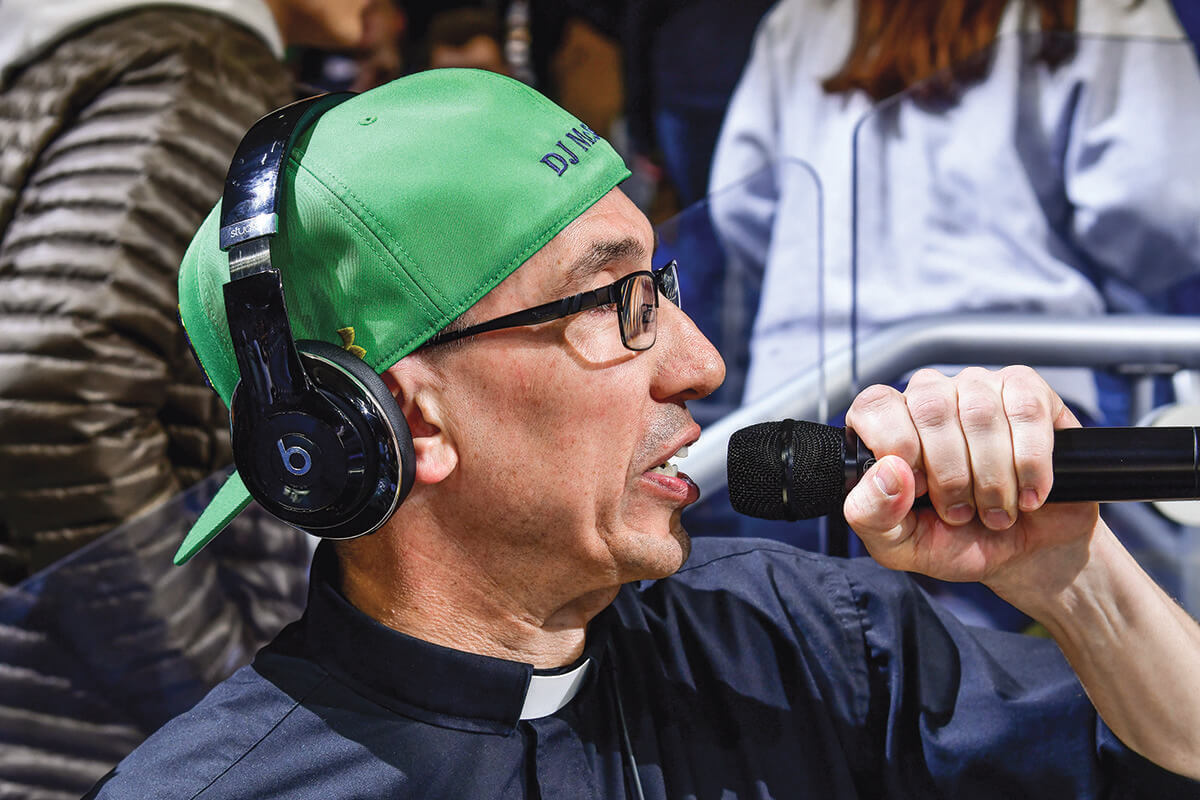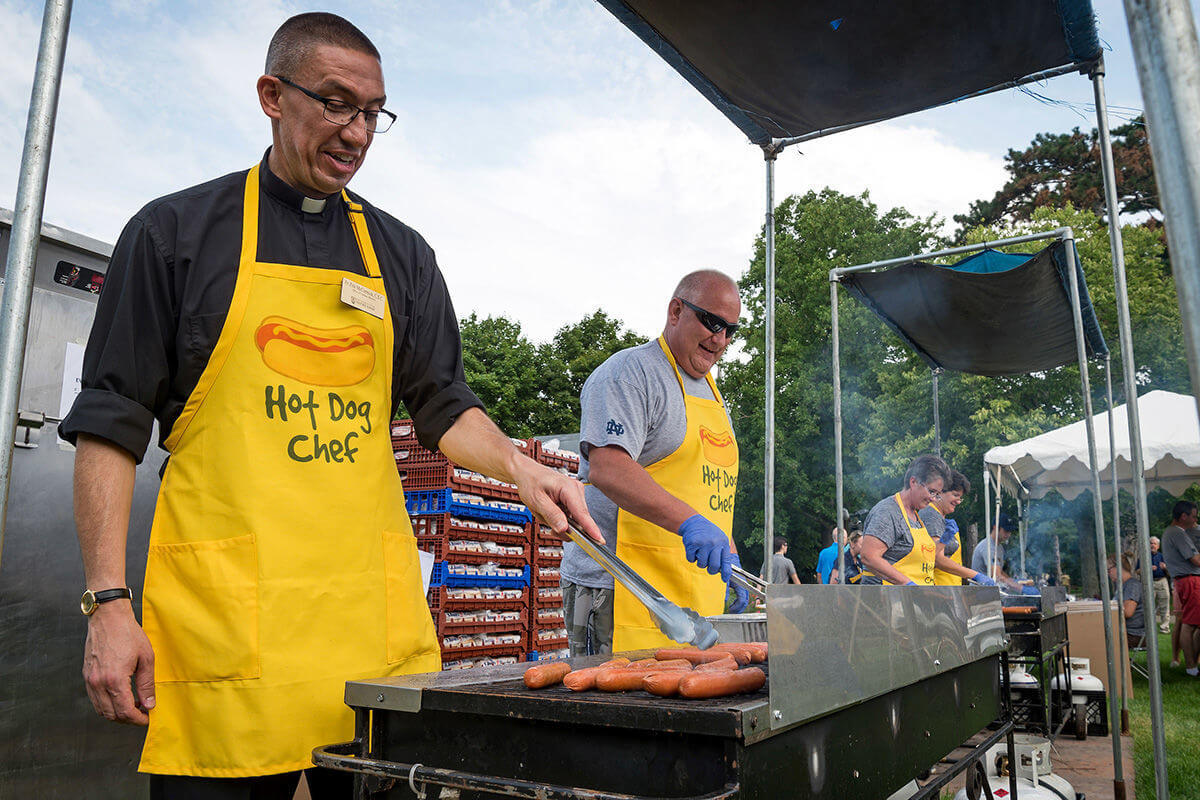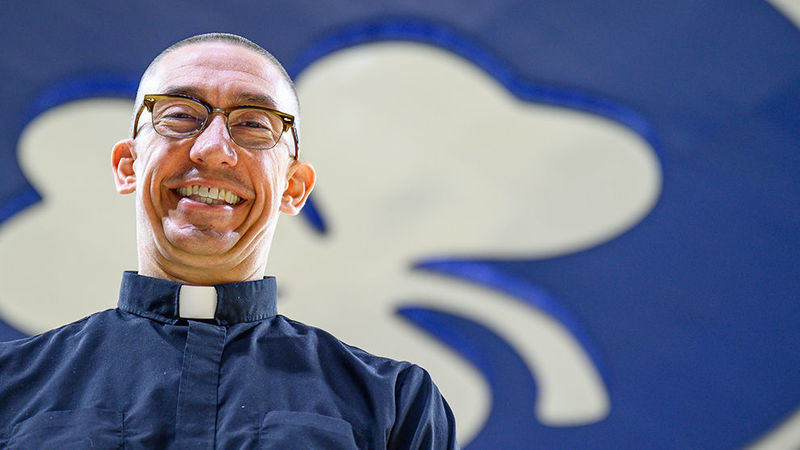When choosing an officiant for your wedding, did you have a priest in mind from the start? And did you, out of a real desire to have him there, invite him to your reception? And did he DJ your reception? If so, the priest is probably Father Pete McCormick, CSC.
The gregarious and gangly Holy Cross cleric has been a staple on campus since the moment he arrived, and with relatable passions like basketball and DJing, his popularity among students, staff and even visitors is legendary. For thousands of people who’ve encountered him in residence halls or his work at the helm of campus ministry, McCormick ’06M.Div., ’15MBA is the picture of a Notre Dame priest. So it may come as a surprise to learn that his journey to campus began not all that long ago, and that his arrival was never guaranteed.
Peter McCormick was born in 1977, the first of six children of a nurse and a former active-duty Marine in Grand Rapids, Michigan. His father worked various jobs over the years, but the first business he owned remains for Pete the most memorable.
“In Michigan we call these things party stores,” he says, “but liquor stores is another way to put it.” Where Party City sells all you need for a Sweet 16 event, the McCormicks’ store sold the essentials for a different kind of party — or as the priest explains it, “beer, liquor and chips.” Pete spent his early years tottering around the shop, learning the value of hard work and, on at least one occasion, posing for a family photo perched on his father’s shoulders between a Michelob display and a poster of a buxom blonde hawking cigarettes.

As untraditional as the setting may have been for McCormick’s earliest memories, they instilled in him a deep love for his family, and when it came time to plan for the future, he envisioned staying in Grand Rapids and eventually having one of his own.
The problem? He realized by adolescence that he might want to be a priest. “I had some questions in my mind about what that would look like or how that might play out,” he says. “So I did what anyone does who’s confounded by a question or an opportunity. I put it on a shelf, and I let it sit there for an extended period of time.”
McCormick studied biology and officiated youth league and high school basketball through five years at Grand Rapids Community College and Grand Valley State University, thinking he’d go into health care or become a teacher and coach. But when his final semester arrived and a job didn’t, he decided he’d give vocations a look.
Inspired by a friend enrolled in Notre Dame’s Old College program for undergraduate seminarians, he inquired with Holy Cross’ vocations office and was invited for a visitation weekend — an offer he promptly refused. “They wanted me to come for four days, and I was like, ‘I am not coming down for four days,’” he says. “So I made up a reason why I couldn’t.”
He’d arrive on Friday afternoon, he told his contacts, and leave the next morning — no budging. Father Bill Wack, CSC, ’89, ’93M.Div. of the vocations office went along with the schedule, but said they should really meet one-on-one before McCormick left town. When the new recruit refused to extend his stay past 8 a.m. on Saturday, they agreed to a meeting at 7. Unbeknownst to McCormick, though, Wack lived in Zahm Hall.
“The notion of asking for an early-morning meeting,” McCormick says now, laughing at his youthful audacity. “That’s insane!”
You could say the rest was history, but that would obscure an important question. How did this homebody from Michigan end up such a quintessential Notre Dame man?
Hindered by the demands of a post-party morning in the dorm, Wack didn’t make it on time — and, true to his plan, McCormick hit the road, happy with his first-ever visit to Notre Dame but convinced he’d never see that vocations guy again. He went back to his studies and his parents’ house and, days later, pulled into his driveway to find Wack’s blue Taurus already there.
The priest claimed he’d been in the area and thought he’d stop by to check in with his prospective seminarian — a story that, to this day, Father Pete doubts. Whether on a detour or a purpose-built road trip, though, this shepherd, who is now the bishop of Pensacola-Tallahassee, Florida, cared enough to track down the lamb that had wandered away. Wack’s effort left a mark.
The two men talked that day at the McCormicks’ kitchen table, and the next semester, Pete entered the seminary at Moreau.
You could say the rest was history, but that would obscure an important question. How did this homebody from Michigan end up such a quintessential Notre Dame man?
McCormick says it’s a story of love — the love the University has for those who study here, and the distance that love can go when one of those students is willing to give it back. But to others, it’s simply what happens when a place of such extraordinary academic power and convention-shattering faith connects with a priest so wonderfully normal.
When I arrived at Notre Dame in 2010, Pete McCormick was a revelation. The then-rector of Keough Hall whom my friends called “FP” laughed a lot. He wore the sleeves of his black shirts rolled to the elbow, ready at any time to shoot hoops or talk pop culture. Though a gifted homilist and skilled interpreter of the Gospel, he seemed approachable — like you could swear in front of him and not even get into (much) trouble.
“Pete just brings life,” says Lenny DeLorenzo ’03, ’08M.A., ’14Ph.D., a Notre Dame theologian who first met McCormick when they were in their 20s. “He’s a life-giver.” And for as long as he’s worked on campus, students have been drawn to that life.
McCormick began his career at Notre Dame as an assistant rector in 2006, when he was just a few years older than the Dillon residents he served. Fourteen years on, he’s the seasoned director of campus ministry, with a longtime men’s basketball chaplaincy, a Mendoza MBA and countless other campus experiences under his belt. But FP’s popularity — and cool-priest cred — hasn’t waned.
According to DeLorenzo, a lot of that rests on McCormick’s people-first personality. “He has natural energy and gifts for people, and people know it,” he says. “People know when someone has a professional smile and they’re kind of humoring them, like it’s a chore to be with them. I don’t think, for Pete, it’s a chore.”
McCormick gains energy from serving students, his friend says, and in a given year, that symbiotic connection plays out in dozens of ways. On campus, he’s in demand to celebrate dorm Masses and appear at student events; among alumni, he performs weddings year-round. His visage earns wild applause from the student section when he appears in mid-game videos in the football stadium, and, though he’s retired from spinning records under the name DJ McSwish, he’s still got a resonant taste for tunes: At the time of this writing, a Taylor Swift-heavy campus ministry playlist he created to launch the spring semester had almost 300 Spotify follows.

Despite all of this, though, FP is in no way the youth pastor trying too hard to relate to his kids. He asks for help when faced with a new technology he could learn, as he did last spring when he joined Instagram as @petecsc (current follower count: 4,685). But he doesn’t pander.
“The moment you start thinking about, ‘Well, if I do this, will this somehow impact the brand that is Pete McCormick?’” he says, “that is the moment you start acting inauthentic.”
And avoiding inauthenticity, he says, is key. Being himself and encouraging others to do the same has certainly helped in the happy moments of the pastoral leader’s life — because, among college students especially, genuine fun will always beget more fun. But it’s crucial in the tough times, too.
McCormick’s career has required him to walk with students through bad grades and bad breakups, the trials of a pandemic and, on a few tragic occasions, even the loss of a classmate or parent. None of those problems can be wiped away by the presence of a single priest, or made better by a one-note insistence on finding the bright side. Yet McCormick has found a compelling reason to stand with students as they weather their storms.
“Mary, the other Mary, and the beloved disciple, John, they stood at the foot of the cross,” he says. “That would have been a horrible place to be. Horrible! But it’s precisely from the foot of the cross that we’re able to see the dawn of the resurrection.” To McCormick, “Hail the cross, our only hope,” the motto of the Congregation of Holy Cross, is an invocation to be brave enough to stay rooted in your own humanity, even when life gets unfathomably hard. It means being open, through vulnerable homilies and honest conversations, about the moments when one’s own life has taken difficult turns, and it means accompanying students as they feel whatever emotions might arise during their sorrowful days.
“You’ve got to stand in the middle of the pain that people are encountering,” he says. “Because if I’m not willing to do that as a priest, what is the point of my vocation?”
Just as Father Pete loves people, there is no doubt that he loves the University of Notre Dame. He characterizes his seminary days with the same story of Fighting Irish infatuation that countless students have known before him and since, and as he starts his third decade here, that infatuation still stands. “Are we perfect? No. Do we do everything flawlessly? No,” he says. “But do we care? Yes.”
He points to the professors who invite far-from-home students to join them for Thanksgiving dinner, and to the student affairs staff who bent over backwards last year to provide meaningful experiences for students during one of the toughest years of their young lives. Not every university behaves like that, as Pete is well positioned to understand.
“Not going to Notre Dame undergrad has given me perspective about the special and unique reality of this place,” he says. “If you just come here [as a student], you presume that this is everywhere — and ladies and gentlemen of the jury, that is not true!
“There’s something so beautiful and special here. It constantly reminds me, like, ‘Hey. Don’t take this for granted.’” High praise from someone who nearly never landed here at all.
Before the Dillon Hall placement that jump-started his career at the University, McCormick spent a year of his seminary training in Goodyear, Arizona, at St. John Vianney parish. The work suited him to the point where he assumed he’d be placed there permanently after his ordination. That he ended up back at Notre Dame instead was a surprise — and he knows there could always be more of those in store.
“Every time I’ve tried to predict the future, I’ve been wrong. ‘I’m going to be a biology teacher!’ Errnt,” he says, mimicking a ballgame-ending buzzer. “‘I’m gonna go to St. John Vianney!’ Errnt. At some point, this is enough data to suggest that maybe I just need to sit tight and focus on what the Lord puts in front of me.”
While there is no sign that the Lord or the congregation are putting anything in front of McCormick except a role at Notre Dame, he says his only future plans are to go wherever he’s sent. And, as his boomerang to and from Arizona shows, that could mean any number of surprising destinations. Wherever he is, though, the normal guy with a passion for people and a love for the Lord will keep being himself. More basketball. Perhaps more popularity. But mostly, a vocation being tended to — as authentically as Father Pete can.
Sarah Cahalan, a former associate editor of this magazine, is a Chicago-based news assistant for The New York Times.
